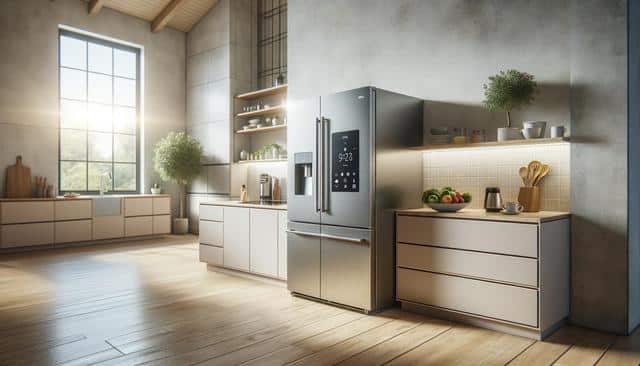
Smart Refrigerators Guide: How the 2025 Kitchen Upgrade Might Just Make Traditional Fridges Obsolete
The Rise of Smart Refrigerators in Modern Homes
Smart refrigerators have emerged as a prominent feature in the connected kitchen, offering homeowners a new level of control and efficiency. As kitchen appliances become more integrated with digital ecosystems, smart refrigerators are leading the charge in transforming how we store and manage food. These appliances are equipped with features that go beyond temperature control, including Wi-Fi connectivity, touchscreen interfaces, and app synchronization. The growing adoption of smart home systems has made it easier than ever to integrate smart refrigerators into everyday routines.
One of the key drivers behind their popularity is the ability to monitor and manage food inventory. With internal cameras and barcode scanning capabilities, these refrigerators can track what’s inside, suggest recipes, and even alert you when items are nearing expiration. This innovation not only enhances food freshness but also reduces waste. As more consumers prioritize sustainability, the role of smart refrigerators in encouraging mindful consumption is becoming increasingly relevant.
Innovative Features That Go Beyond Cooling
Unlike traditional models, smart refrigerators come packed with features designed to streamline everyday kitchen tasks. These enhancements are not just about convenience—they deliver functional improvements that make a tangible difference in daily life. Some of the standout features include:
- Touchscreen displays for calendar syncing, note-taking, and media playback
- Voice command compatibility with digital assistants
- Remote monitoring and temperature adjustments via smartphone apps
- Automatic grocery list creation based on inventory detection
These smart functions are making refrigerators more interactive and intuitive. For families, this means easier coordination and meal planning. For tech enthusiasts, it’s an exciting evolution of a previously mundane appliance. As manufacturers continue to innovate, these features are expected to become more advanced, integrating artificial intelligence to further personalize user experiences.
Smart Refrigerators and Energy Efficiency
While functionality and innovation are important, the impact of smart refrigerators on energy efficiency is equally significant. Traditional refrigerators often operate on outdated systems that consume more power. In contrast, smart refrigerators are designed with energy-saving technology that not only reduces electricity consumption but also allows users to monitor usage in real time.
Energy management is enhanced through features like:
- Adaptive defrosting to minimize unnecessary energy use
- Power usage reports accessible via mobile apps
- Eco modes that adjust cooling based on usage patterns
These capabilities are particularly valuable for households looking to reduce their carbon footprint and manage utility costs. As environmental awareness continues to influence consumer choices, energy-efficient smart appliances are becoming a preferred option in modern kitchens.
How Smart Refrigerators Support Healthy Living
Smart refrigerators are not just about food preservation—they also support healthier lifestyles. By tracking food inventory and suggesting recipes based on available ingredients, these appliances can help users make more nutritious choices. Some models even integrate with health and fitness apps, allowing users to align their diet with their wellness goals.
Key contributions to healthy living include:
- Meal planning suggestions based on dietary preferences
- Alerts for expired or unhealthy items
- Integration with nutrition tracking platforms
With these features, smart refrigerators become proactive partners in maintaining a balanced diet. This functionality is particularly useful for busy individuals or families seeking to simplify meal preparation without sacrificing quality or nutrition. As the wellness trend continues to grow, the role of the kitchen as a health hub is becoming more pronounced—making smart refrigerators an essential component in that transformation.
What to Consider Before Making the Upgrade
While the benefits are clear, upgrading to a smart refrigerator involves important considerations. One of the first things to evaluate is compatibility with existing smart home systems. Ensuring seamless integration with other devices can maximize the functionality of your smart kitchen. Budget is another factor, as smart refrigerators are typically priced higher than traditional models due to their advanced technology.
Here are a few factors to keep in mind before purchasing:
- Home network strength and Wi-Fi coverage
- Desired features versus daily usage needs
- Availability of firmware updates and customer support
- Long-term energy savings potential
Researching these aspects can help ensure you invest in a model that aligns with your lifestyle and household needs. As the market continues to grow, a wider range of models is becoming available, making it easier to find a unit that fits both your preferences and your budget.
Conclusion: Embracing the Future of Kitchen Technology
Smart refrigerators are reshaping how we interact with one of the most essential kitchen appliances. By offering features that promote convenience, energy efficiency, and healthier living, they represent a significant leap forward in kitchen innovation. As we move into 2025, the continued evolution of smart home technology is likely to make these appliances a standard fixture in modern homes. For those considering a kitchen upgrade, smart refrigerators offer a compelling blend of practicality and forward-thinking design—making them a noteworthy investment for the connected household.